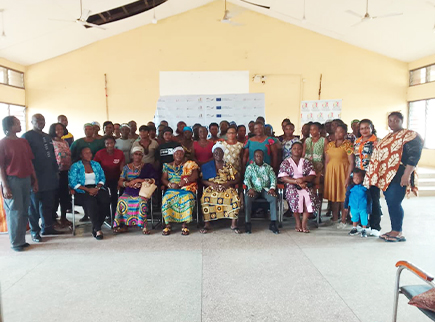The National Commission for Civic Education (NCCE) has held a community engagement on the theme “Strengthening the Rule of Law and the Fight Against Corruption in Ghana” in the South Tongu Municipality.
The forum, co-funded by the European Union (EU) in partnership with the Commission on Human Rights and Administrative Justice (CHRAJ), formed part of a series of sensitisation programmes aimed at promoting civic responsibility and good governance at the grassroots level.
Mr. Oral-Robert Amenyo, Deputy Regional Director of the NCCE, said the exercise was to deepen citizens’ understanding of corruption and inspire collective responsibility in confronting it.
He stressed that corruption was a national concern that demanded the involvement of all, not just a few individuals or institutions.
“We must sensitise ourselves to know what corruption is, what causes it, and how it affects us as citizens. The more we understand its dangers, the better we can stand together to fight it,” he said.
He explained that the initiative formed part of the Commission’s ongoing outreach to various community groups to promote civic consciousness and accountability.

After engaging youth groups last month, he said, the Commission had turned attention to women, who were being encouraged to take the message back to their associations and homes to broaden the campaign’s reach; focusing on women drawn from identifiable groups, including traditional leaders, market queens and artisans.
Mr. Amenyo appealed to all Ghanaians to take personal responsibility in combating corruption in their own spaces. He urged the public not to leave the fight to leaders alone, but to demonstrate integrity in their daily dealings.
“Whether at home, in the market, or at the workplace, let each person be a champion of honesty and fairness. Together, we can build a nation free from corruption, and be proud of its values,” he said.
Mr. Philemon Boni, Acting Municipal Director of the NCCE, said the NCCE would continue to raise public awareness on the principles of rule of law and the need to collectively combat corruption, which he described as a major setback to national development.
“We have come to realise that corruption thrives largely because many citizens are not fully aware of the laws of the state. This programme therefore aims at sensitising women who are among the most vulnerable, to understand their rights and roles in the fight against corruption,” Mr. Boni stated.
He said the NCCE was encouraging women to be bold in speaking out against acts of corruption and to hold duty-bearers accountable, stressing that “no one is above the law, whether a politician, a chief or an ordinary citizen.”
“Once you are found guilty under the law, you should be liable and face the appropriate sanctions. This is the only way to build public trust and uphold justice,” he added.
Ms. Wendy Emefa Dogbey, Acting Municipal Director of CHRAJ, said the collaboration between the two institutions was crucial in empowering women to report cases of bribery, corruption, and domestic abuse without fear of intimidation.
“We have received numerous cases of corruption and domestic violence in our communities, but many women fail to speak out because they feel harassed or intimidated,” she said.
She added: “Through engagements like this, we want to encourage them to be assertive and seek justice when their rights are abused.”
She noted that about 70 per cent of reported human rights cases in the area involved domestic violence and abuse and urged community leaders to help eliminate negative social norms that hinder women’s empowerment.
The engagement, facilitated by officers from NCCE and CHRAJ, also featured discussions on domestic violence, whistleblowing, and accountability mechanisms within the public sector.
Participants at the forum expressed appreciation to the NCCE and CHRAJ for the initiative, describing it as eye-opening and empowering.
They said the discussions had helped them better understand the Rule of Law, and their role in curbing corruption at the community level.
They noted that many citizens often associate corruption with politicians, but the engagement had enlightened them that it can occur in everyday activities, including markets, offices, and homes.
The women also said the programme had boosted their confidence to speak out against injustices and demand accountability from public officials and community leaders.
They pledged to serve as advocates for integrity within their various groups and called for more of such sensitisation programmes, particularly in rural areas, to help others become aware of their rights and responsibilities in the fight against corruption.

